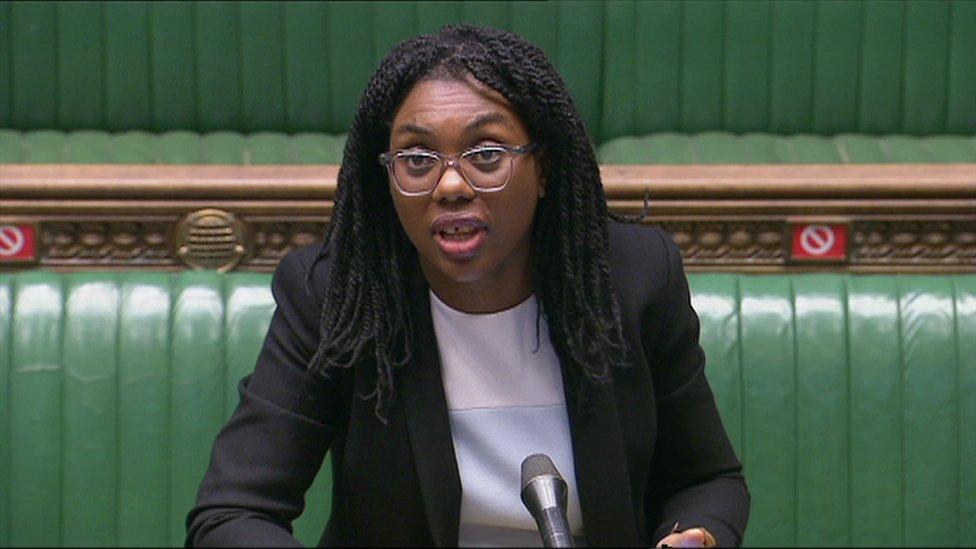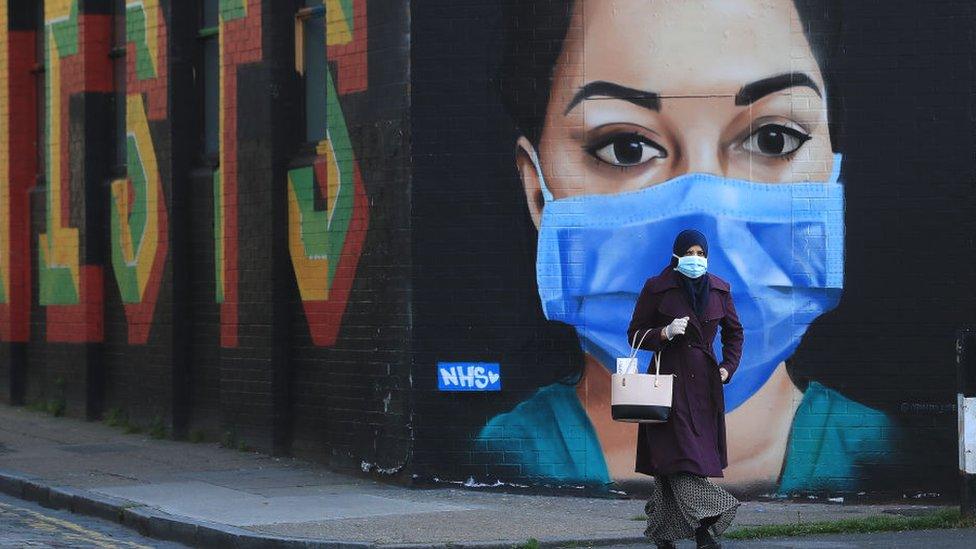Covid: Community scheme launches to help at risk groups
- Published

The government is launching a community champion scheme to help "rebuild trust" and "reduce transmission" of Covid-19 within ethnic minority groups.
Equalities Minister Kemi Badenoch set out the plan in the Commons after leading an inquiry into the disproportionate effect of the virus.
She also called for more people from those backgrounds to join vaccine trials, taking part in one herself.
But Ms Badenoch said these were only the "first steps" of action.
In June, a report by Public Health England suggested racism could be contributing to the increased risks of black, Asian and minority communities catching and dying from Covid-19.
The equalities minister said the findings of her latest report put it down to "a range of socio-economic and geographical factors", including exposure at work, population density and household composition, as well as pre-existing health conditions.
However, Ms Badenoch said the risks "remained unexplained for some groups" and further analysis is planned for the coming months.
She will report back to MPs at the end of the next quarter with the latest evidence.
Labour's shadow equalities minister, Marsha de Cordova, accused the government of "still lacking a forward looking strategy and action plan".
She said: "The government has fallen short of what is needed… and [the plan] does not commit to much that is quantifiable or timed."
BAME coronavirus deaths: What's the risk for ethnic minorities?
On Thursday, the government's Racial Disparity Unit published its first quarterly report on the key factors that put non-white people at high risk.
Dr Raghib Ali, who advises the government on ethnicity and Covid, said while studies often differed in their conclusions, the older people are, and where they lived, were two of the biggest factors behind the increased risks.
He added that much of the increased risk faced by ethnic minorities could be explained by these considerations as well as occupation, living in crowded housing and having a pre-existing condition.
But he agreed with the report authors that a "small part" of the excess risk remained unexplained for some groups.
A recent government review confirmed, external found that people of Bangladeshi heritage were dying at twice the rate of white Britons, while other black, Asian and minority ethnic groups had between 10% and 50% higher risk of death.
'Grassroots'
The community champion scheme will see £25m put into working with "grassroots advocates" who now how their communities are being impacted by the virus.
The government hopes this will contribute to their knowledge of the effects of Covid, as well as helping to better spread the message of precautions people need to take.
Other recommendations from Ms Badenoch's report include:
Making it mandatory for ethnicity to be recorded on death certificates in order to better understand the impact of the virus on ethnic minorities
To provide assessments at work for everyone, not just people from ethnic minority groups
To develop a risk calculator tool at the University of Oxford to help doctors and individuals understand more about their risks from Covid.
The equalities minister told the Commons: "We must move away from seeing Covid-19 as something that affects discrete groups in society and towards helping individuals understand their own particular risk profile as the evidence base grows."
Labour MP Afzal Khan warned people from ethnic minorities had accounted for nearly a third of Covid patients admitted to intensive care since September, and were "bearing the brunt" of a second wave of the virus.
He said it "appears no lessons were learnt or effective actions taken over the summer" and called on the government to "recognise this failure".
- Published22 October 2020

- Published13 June 2020
